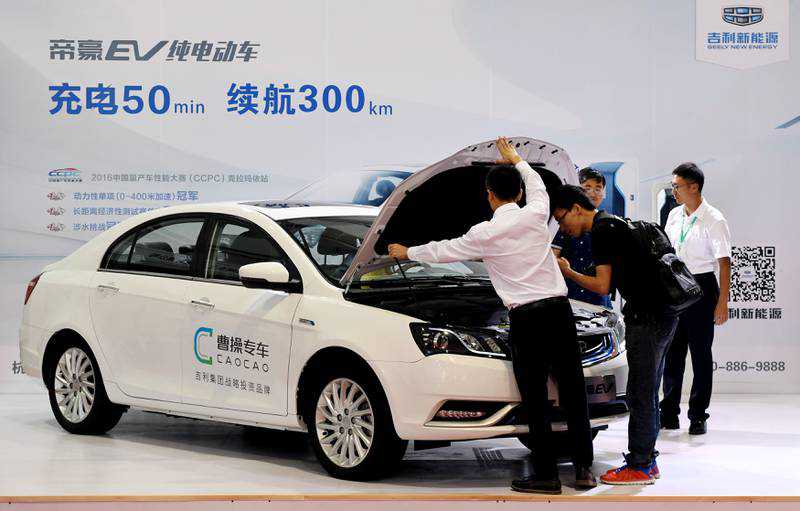China plans to merge electric vehicle companies in its fragmented market

Image: Collected
China has vowed to consolidate the country’s electric vehicle industry after a decade-long nurturing of the sector led to the emergence of too many players, some of which are barely viable.
“Looking forward, EV companies should grow bigger and stronger. We have too many EV firms on the market right now,” Xiao Yaqing, China's Minister for Industry and Information Technology, said at a press conference in Beijing on Monday.
“The firms are mostly small and scattered,” he said. “The role of the market should be fully utilised and we encourage merger and restructuring efforts in the EV sector to further increase market concentration.”
China, which built its electric-car industry into the world’s biggest, is putting a new focus on consolidating the ranks of EV makers, which have ballooned to about 300.
The government is drafting measures to rein in overcapacity in the sector and channel resources to production hubs, Bloomberg reported earlier.
Regulators are considering setting a minimum production capacity utilisation rate for the industry, and provinces that are not meeting it would not be allowed to approve new projects until surplus capacity comes online.
The focus on moving the EV industry to a more sustainable footing comes as China shakes up industries from tutoring to property to big-tech in President Xi Jinping’s quest to remodel the nation’s economy and society.
Shares of Chinese EV makers fell on Monday. Xpeng declined as much as 3.2 per cent in Hong Kong trading and Li Auto dropped as much as 1.8 per cent. On mainland exchanges, BYD slid 2.1 per cent and BAIC BluePark New Energy Technology slumped 5.2 per cent.
The rapid growth of China’s EV market has been spurred by government subsidies to encourage consumers to switch to cleaner cars. Total central government subsidies for new energy vehicle purchases stood at 33 billion yuan ($5.1bn) in the five years through 2020, ministry for Industry and Information Technology data shows.
In response, provincial authorities have offered tax breaks and other incentives for EV manufactures to set up shop, leading to overcapacity. Jiangsu province, north of Shanghai, for example is now home to around 30 car makers, several of them bankrupt.
The average production capacity utilisation rate for car makers in China overall was about 53 per cent last year, according to calculations based on a Jiangsu province submission to the National Development and Reform Commission earlier this year.
“Looking forward, EV companies should grow bigger and stronger. We have too many EV firms on the market right now,” Xiao Yaqing, China's Minister for Industry and Information Technology, said at a press conference in Beijing on Monday.
“The firms are mostly small and scattered,” he said. “The role of the market should be fully utilised and we encourage merger and restructuring efforts in the EV sector to further increase market concentration.”
China, which built its electric-car industry into the world’s biggest, is putting a new focus on consolidating the ranks of EV makers, which have ballooned to about 300.
The government is drafting measures to rein in overcapacity in the sector and channel resources to production hubs, Bloomberg reported earlier.
Regulators are considering setting a minimum production capacity utilisation rate for the industry, and provinces that are not meeting it would not be allowed to approve new projects until surplus capacity comes online.
The focus on moving the EV industry to a more sustainable footing comes as China shakes up industries from tutoring to property to big-tech in President Xi Jinping’s quest to remodel the nation’s economy and society.
Shares of Chinese EV makers fell on Monday. Xpeng declined as much as 3.2 per cent in Hong Kong trading and Li Auto dropped as much as 1.8 per cent. On mainland exchanges, BYD slid 2.1 per cent and BAIC BluePark New Energy Technology slumped 5.2 per cent.
The rapid growth of China’s EV market has been spurred by government subsidies to encourage consumers to switch to cleaner cars. Total central government subsidies for new energy vehicle purchases stood at 33 billion yuan ($5.1bn) in the five years through 2020, ministry for Industry and Information Technology data shows.
In response, provincial authorities have offered tax breaks and other incentives for EV manufactures to set up shop, leading to overcapacity. Jiangsu province, north of Shanghai, for example is now home to around 30 car makers, several of them bankrupt.
The average production capacity utilisation rate for car makers in China overall was about 53 per cent last year, according to calculations based on a Jiangsu province submission to the National Development and Reform Commission earlier this year.
Source: https://www.thenationalnews.com
Previous Story
- China’s Xiaomi overtakes Apple to grab second spot...
- Chinese recovery slows down: Retail sales disappointment hits...
- Chinese regulators meet with developer Evergrande as scrutiny...
- Hugo Boss aims to double sales to 4...
- Marcolin boosts presence in China with new subsidiary
- China's online regulator orders removal of 25 Didi...
- Syngenta looks to China's farmers for growth ahead...
- Seizing the opportunities of a circular economy in...